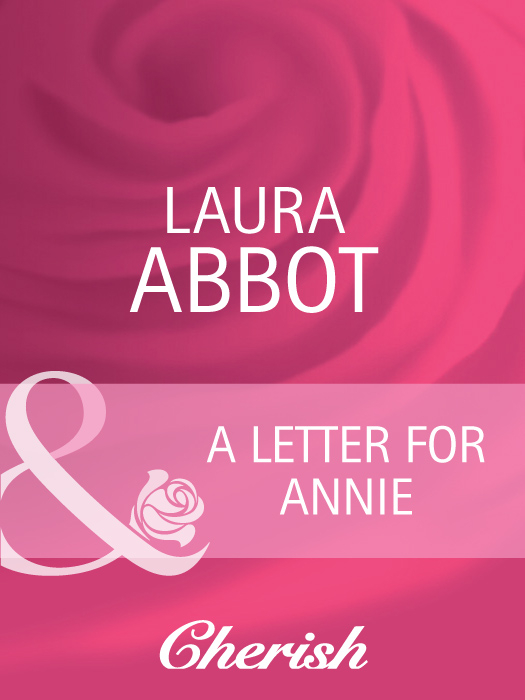
Полная версия
A Letter for Annie


Kyle felt a gentle hand on his shoulder and opened his eyes
Annie stood in front of him, her lip trembling. He rose, mere inches from her.
“It’s Auntie G.” She paused, as if unable to go on. “They’re…hospitalizing her. Dehydration, the doctor said. And other complications. Fluid buildup and…”
He couldn’t help himself. He reached for her. “I’m so sorry.”
A sob choked her and she pressed herself into his arms, dampening his shirtfront with her tears. “Oh, Kyle, what am I going to do?”
He held her in his embrace, breathing in her floral scent, thinking of all that had happened between the two of them. It didn’t matter. None of it did. Because he knew the answer to her question. This. Simply and inevitably this.
Dear Reader,
Recently I spent a week with our youngest grandchild. Eight years old, she told me, “Nana, I want to be an author.” As we chatted about writing, I suggested that every story needs to give a sense of place and every protagonist should undergo a positive change. She was off and running, filling pages with the fruits of her fertile imagination.
A Letter for Annie came from several trips to Oregon. The ruggedly beautiful Pacific Coast inspired the setting of this book. As for change in the main characters? Initially, Annie is simply marking time in her life. When circumstances force her to return to Eden Bay, she is not prepared to meet former classmate Kyle Becker. Remembering how Annie broke his best friend’s heart, Kyle resents her presence.
Good storytelling involves a journey that betters the main characters, and good romances focus on the redeeming power of love. I hope you will find both Annie and Kyle become better people and deserve the love they share.
Enjoy,
Laura Abbot
P.S. I always appreciate hearing from readers. You may write me at P.O. Box 373, Eureka Springs, AR, 72632-0373, or at LauraAbbot@msn.com.
A Letter for Annie
Laura Abbot

For our talented, motivated and loving
grandchildren.
You give us constant joy, fill us with pride and
promise us a hopeful future.
May your lives be forever blessed.
CONTENTS
PROLOGUE
CHAPTER ONE
CHAPTER TWO
CHAPTER THREE
CHAPTER FOUR
CHAPTER FIVE
CHAPTER SIX
CHAPTER SEVEN
CHAPTER EIGHT
CHAPTER NINE
CHAPTER TEN
CHAPTER ELEVEN
CHAPTER TWELVE
CHAPTER THIRTEEN
EPILOGUE
PROLOGUE
Afghanistan
Early 2003
BORED AND CHILLED, Sergeant Kyle Becker huddled in the driver’s seat of the Humvee, watching a watery sun sink behind the rugged, snow-covered peaks. As soon as the guys finished securing the last pontoon of the river crossing, they could head out of this godforsaken wilderness back to base. They’d been lucky this time. No Taliban guerrillas harassing them. No toothless mountain men glaring at them or big-eyed children begging for chocolate. Just another friggin’ mission.
The first of the Guard engineers loaded their gear and climbed in. The rest followed quickly. Kyle turned on the ignition so they could hightail it as soon as the stragglers were aboard. Pete brought up the rear. He opened the passenger door to ride shotgun, then paused and reached into the pocket of his parka.
“Save it, Nemec.” Kyle revved the motor. “We’re getting the hell out. Now.”
“Just one peek while it’s still light.” Pete turned his head to get a better look at the photograph of a smiling girl with reddish-brown hair and soulful hazel eyes. It took only a fraction of a minute. One fraction too long.
Before any of the Guardsmen could react to the movement behind the rock, Pete lay on the ground, blood from a temple wound pooling in the dirty snow.
“Shit!” Heart thundering, Kyle slid from the truck, shouldered his weapon and crawled to his friend’s side. There was no sign of the sniper, a crumpled body the only evidence he had ever been there.
With his lifeless buddy’s head resting against his shoulder, the drive back to base seemed interminable.
CHAPTER ONE
Eden Bay, Oregon
Early April, 2009
FOG VEILING the rugged Oregon headlands and an angry ocean were unmistakable omens: Turn back. You don’t have to do this. Ignoring her internal voices, Annie Greer pulled in front of her great-aunt Geneva’s seaside cottage and sat for a long moment in her battered Honda, gathering herself to face what lay ahead.
Only Auntie G. could have compelled Annie to return to the town she’d fled a decade earlier. Out of the blue the call had come to Bisbee, Arizona, where she earned her living waiting tables and creating individually crafted handbags. On the day she celebrated her first sale to a pricey boutique in Scottsdale, the telephone had shattered her euphoria. Carmen Mendoza’s summons had been brief and urgent. “Your tia Geneva, she has put off asking me to call. But now I think I must. She has not so long. I am with her, of course. But I am not family. She should not die without family. She has only you. Please to come home.”
A gull shrieked overhead, and Annie gathered her windbreaker closer to ward off a sudden chill. Home. She snorted. Once, Eden Bay had been exactly that. Once, she had imagined a future here. But on a cloudless May night ten years ago, her dreams—and her innocence—had died swiftly, mercilessly. She had hoped never to set foot in Eden Bay again, never to confront painful memories.
However, she couldn’t turn away from her great-aunt Geneva, now that the elderly woman was suffering from congestive heart failure. Not after all Geneva had done in those days when Annie had desperately needed to hide where no one from this town could ever find her. Although Carmen had been her aunt’s faithful caregiver and companion for years, she was right. She wasn’t family.
Only Annie was family.
After the death of Annie’s mother the summer following her junior year in high school, Auntie G. had become Annie’s sole living relative. Even so, because of Geneva’s frequent world travels, they had seen little of each other in the past few years. It would be good to share this precious time.
Annie continued staring at the cottage, fending off memories that filled her with shame.
Finally, knowing Auntie G. needed her, she opened the car door and stood gazing at the roiling ocean, licking sea salt from her lips. She loved her great-aunt, but returning to Eden Bay was the second most difficult decision she had ever made in her life.
GENEVA GREER SPREAD the afghan over her legs and adjusted the nosepiece of her portable oxygen tank. She had been reluctant to uproot Annie, but the truth was, Geneva didn’t want to depart this world without seeing her great-niece again. Without making one more attempt to help Annie come to terms with the past.
Glancing around the room, she hoped Annie would find solace in the familiarity of the Greer family beach house. The fireplace with its hand-crafted mantel and built-in wood box, the brass telescope on the window ledge, the ship’s model on top of the bookcase—all of these things had been here since Geneva’s father built the Cape Cod–style cottage in the mid-1930s. Some of her happiest childhood memories were of carefree days with her younger brother, running wild on the beach, wading into the surf, studying marine life in the tide pools.
Now the house was nearly as weathered as Geneva. The railing on the front porch was dangerously loose and a water stain marred the ceiling in one of the upstairs bedrooms. She wondered what Annie would think of her legacy. Whether it would tether her to Eden Bay. Or provide her with the means of leaving the place behind, once and for all.
Lost in her thoughts, she roused at the sound of a car door slamming. In years past, she would have raced out to greet her beloved great-niece. Now, she could only wait.
Peering through the window, Geneva feasted her eyes on Annie, whose shoulder-length auburn hair stirred in the wind. Her pale, freckled face, unadorned with makeup, reminded Geneva so much of her own long-dead brother. Dressed in jeans, a shapeless maroon windbreaker and purple Crocs, Annie paused, shading her eyes with her arm to look toward the sea. Then with a resolute lift of her shoulders, she turned and walked toward the house, rearranging her expression from wistfulness to welcome.
Geneva sighed. Annie was home. But pain, she knew, would dog her niece’s every step. She shouldn’t have summoned her. Selfish old woman.
If only…if only she didn’t need her so.
OPENING THE DOOR, Carmen engulfed Annie in a warm hug. “It is good you are here,” she said, before standing aside. Annie set down her backpack and stood silently, soaking it all in.
First came the familiar smells—musty books, lemon oil, bread fresh from the oven. Then the sights—the brass umbrella stand, the ornate upright piano that had belonged to her grandmother and Geneva’s easel, splotched with every color of the rainbow. Annie took a deep breath, propelled into a time when this house had been a happy place, her sanctuary.
“Annie?” The voice was faint, raspy, anxious. Nothing like the lilting alto she remembered. Carmen nodded toward the bay window facing the ocean.
Moving into the room, Annie found her great-aunt huddled beneath a multicolored afghan. Auntie G. had always been vibrant, larger than life. Her robust laughter, expansive gestures and bohemian clothing had made her, for Annie, the most exotic and beloved of creatures. She forced a smile so as not to betray her shock, then knelt beside the pale husk of a woman engulfed by the chair she had once dominated. “Auntie G., I’m so happy to see you.” Annie struggled to control her voice. “I’ve missed you.”
“And I you, petunia.”
Use of the pet name melted away the years, and for a fleeting moment, Annie could feel her father’s arms hoisting her over his head. Touch the sky, my little petunia.
Geneva rested a frail hand on Annie’s hair. “I didn’t want to ask this of you.”
“I know. But you’re worth it.”
“Maybe it’s time you came back anyway.” Geneva fingered the fringe of her afghan. “It’s hard work burying the past, but it needs to be done.”
I don’t want to talk about this. Please, not now. “I doubt that’s possible. Anyway—” Annie projected a cheerfulness she did not feel “—I’m here for you, not me.”
“The point is to make the most of every moment. I want time with you, but we have to be realistic. It won’t last long.”
Annie buried her face in her aunt’s lap, silent tears falling on the afghan. When she raised her head, her voice broke. “I need you. I can’t face this place by myself.”
“You can and you will, with or without me.”
Despairing, Annie had no answer. Like a diabolical metronome, the oxygen tank ticked off Geneva’s breaths. Annie fought the impulse to run to her car, throw it in gear and race far away. Yet, if not for her great-aunt, where in God’s name would she be now?
Stark raving mad, probably. The automatonlike life she’d lived since leaving this town was safer. At least in Arizona she’d been able to keep memory at bay. If only she could barricade herself in this house that had once sheltered her. Simply be with Geneva. Not let anyone else know she’d returned.
“Tea?” Carmen entered holding a tray with a cup of tea and homemade brownies.
Annie rose, took the tray and settled in the cane-bottomed rocker across from Geneva. “Thank you,” she said, struggling to smile at Carmen. “I forgot about lunch, so this is a welcome snack.”
“Save room for dinner. My special enchilada casserole. Maybe we can tempt Señorita Geneva.” Carmen’s brown eyes signaled her concern.
Annie studied her aunt. “Aren’t you eating?”
Geneva waved her hand dismissively. “I’m on a diet.” She managed a chuckle. “All my life I’ve wanted to be svelte. A pity I had to wait until now.”
Annie appreciated the attempt at humor. Still, Carmen had not exaggerated the severity of Geneva’s condition. Annie took a sip of tea, mentally vowing to set aside her own pain to alleviate Geneva’s. But was that possible here in Eden Bay?
“DAMN IT TO HELL.” Kyle Becker stood on the roof of the Brady place, staring at the half-assed job the roofer had done. No wonder it leaked. Shoddy workmanship and shortcutting on materials. Kneeling, he pried up a layer of shingles and cursed again. What was so hard about doing a job right? But then, if everyone did a perfect job, he’d be out of work. Repair jobs helped pay the bills, but they weren’t nearly as satisfying as remodels where a guy could feel he’d actually created something. Cleaning up other people’s mistakes wasn’t his idea of fun.
Standing, he holstered his claw hammer and, fighting the wind, moved carefully toward the ladder. From here he had a clear view of other houses dotting the coast and of the Pacific beyond, frothing with whitecaps. This was what he wanted—a home overlooking the ocean. In your dreams, buddy. The day you have a house in the six-or seven-digit range is the day a tsunami swamps the whole damn West Coast.
Swinging over the edge of the roof, he started down the ladder, then stopped, his eyes fixed on the Greer cottage in the distance. Isolated from its neighbors, vulnerable to sun and storms, it represented the quality craftsmanship of a bygone era. He squinted. Lights shone from the windows. Was the old lady back? Odd. She hadn’t been here in a long time. Parked in front of the house was an older-model car. Surely not Geneva’s. She drove only flashy foreign cars. Usually red or yellow. Shrugging at his idle train of thought, he clambered to the ground.
Bubba, his half Lab, half German shepherd, jumped from the bed of Kyle’s pickup and danced delighted circles around him, as if knowing they would shortly be on their way home. Kyle knelt beside the dog, scratching the thick fur behind his ears. “Hey, fella, ready for the barn?” Nonstop tail-wagging provided a clear answer. Kyle opened the door of the cab. “Hop in, buddy. But don’t get too excited. We have to stop by the office on our way home.”
It was nearly five-thirty when they rolled into the lot of Nemec Construction. The company vehicles were already aligned in rows, and the warehousemen were heading out the door. Clouds gathering in the west obscured the weak April sun, so Kyle tucked his sunglasses in the pocket of his denim work shirt. “Wanna come see Rita?” The dog perked up his ears and eyed Kyle expectantly. Kyle climbed out of the truck. “C’mon, then.”
This was their evening ritual. Bubba wouldn’t leave the cab until Kyle invited him. And every evening, Rita, the plump, friendly receptionist, had a doggie treat waiting in the office.
When they entered, Rita looked up from her computer. “Hey, handsome, who’s your friend?” She winked at Kyle, as she always did. Bubba sat beside her desk, his tail wagging. “Have you been a good boy today?” The dog lifted one leg and pawed the floor, a trick she had taught him. “Okay, Bubba. Here you are.” She pulled a box of dog biscuits from her drawer and gave him one. He mouthed it and scurried off to a corner to enjoy the morsel.
“You’re spoiling him.”
“Nonsense. He just needs some good mommy-loving.” She raised an eyebrow. “Something he sure can’t get from you.”
Kyle laughed. “Jeez, I hope not. We’re manly bachelors.”
“Don’t you think it’s time you found a better bed partner than a hairy beast?”
“Meddling again?”
“Somebody needs to, you big blockhead.”
“I suppose you’ve got somebody in mind?” The minute the words left his mouth, he wished them unsaid.
Rita nodded imperceptibly toward the office area behind the glass divider at her back.
Kyle followed her gaze, then shifted awkwardly from one foot to the other. Rosemary. It figured. “Wouldn’t that be a cliché? Dating the boss’s daughter?”
Rita tapped a pen impatiently. “Nonsense. You know darn well you’re practically like one of the family already. You could at least try to make it official.”
Kyle sighed. He’d had this conversation more than once and usually offered a litany of excuses. Rosemary was younger. He couldn’t date the bratty little sister of his best friend. He might be accused of currying favor with the boss. She was a nice girl, but nice girls weren’t his type. None of it had deterred Rita.
Nor Rosemary, who continued to flirt and look at him with hope. Rosemary, who had Pete’s eyes. In a way, Kyle wished he could be attracted to her. Rita was right about one thing. It did get damn lonely in that mobile home of his. And he was sick to death of his own cooking. Even so, he was better off not encouraging Rosemary. He needed to keep his relationships with the Nemecs on as businesslike a basis as possible, to know he’d earned every responsibility Bruce Nemec had given him.
“Here.” He thrust his notes into Rita’s hands. “Can you write up the bid for the Brady place and mail it to them?”
“Sure.” Rita tucked the paper into a folder and stood. “Got big plans for tonight? After all, it’s Friday.”
“I figure I’ll treat myself to an evening at the Yacht Club,” he said, referring to a local bar near the fishing pier.
“That’ll be a novelty. Do you ever go anyplace else?”
“Nah, why change my routine?”
Rita picked up her sweater from the back of her chair and shrugged into it. “You’re impossible.”
“That’s why you love me, right?” He threw Rita a roguish grin. “See you Monday.” Then he called Bubba and they headed for the truck.
On the way home, Kyle drove slowly, pondering Rita’s comments. The rut he was in, though comfortable, was also paralyzing. Bruce had made no secret of the fact he was grooming Kyle to take over Nemec Construction someday. Putting him in charge of their home repair and remodeling division, AAA Builders, was a tacit step toward that end. But the company should have been Pete’s. Damned if Kyle would worm his way further into the family by marrying Rosemary. Besides, she deserved more than he could give.
He didn’t want to think about any of this. Especially not about Pete. Remembering was too painful. More than anything, he missed the friendship they’d shared ever since they were happy-go-lucky kids riding their bikes all over Eden Bay.
But that was then. Kyle was far from happy-go-lucky now. He survived one day at a time. Nose to the grindstone. Minding his own business. Expecting nothing.
A fog rolling in from the ocean forced him to concentrate on driving. Beside him, Bubba licked his chops, then pressed his nose to the passenger-window glass.
A man and his dog. It was enough.
THE MORNING AFTER her arrival Annie stood at the window facing the sea, watching rivulets of water smear the panes. The rain had started late last night shortly after she’d moved all her belongings to this upstairs front bedroom, the one that had always been Geneva’s. Now, because of her weakened condition, Auntie G. stayed in the downstairs bedroom. The damp Pacific coast was a far cry from the dry desert air. No welcoming sun greeted Annie here. But what had she expected? In memory, she’d always pictured Eden Bay through a scrim of gray mist.
Pulling the oversize plaid flannel shirt closer around her, she turned to study the room. Although most of her aunt’s belongings had been moved, the double bed with the inlaid wood headboard and its matching dresser were still here, as were several of Geneva’s oil paintings, including the one Annie had always liked best—a rocky beach scene with white-tipped, emerald waves crashing against the shore.
A wide, six-foot-long table stood against the north wall. Annie didn’t know where it had come from, but Geneva’s thoughtfulness of providing a worktable made Annie feel at home in a way little else could have.
Moving to the first box, she unpacked multicolored scraps of upholstery material and stacked them beneath the table. In a second carton she located shears, scissors, spools of thread, braiding and her large button box. She arranged these items neatly on the left, then pulled a piece of cranberry floral material from the fabric pile and spread it across the surface, visualizing the exact way she wanted to cut it to transform it into a satin-lined tote. For the first time since Carmen’s call, she felt the coils of tension ease.
Keeping busy was the answer. Between caring for Geneva and burying herself in work, there would be no time to think, to remember.
At the sound of a light tap on the door, she said, “Come in.”
Carmen waited with a tray. “Breakfast, Annie? Your tia, she is still sleeping.”
With the first whiff of blueberry scones and coffee, Annie realized she was ravenous. “Thank you, Carmen.” She moved across the room and took the tray. “But I don’t need to be waited on.”
“Maybe just for today.” In the woman’s eyes, Annie read understanding.
Annie set down the tray. “Will you call me when Geneva is awake?”
“Sí. Your visit, it is bringing her joy.”
“What have her doctors said?”
Carmen shook her head. “Better to ask her. It is not for me to tell.”
“I need the truth.”
“She is strong. She is not afraid of that truth.” Carmen nodded at the tray. “If you want more, come to the kitchen.”
“Thank you.” Annie closed the door behind Carmen, then sat with her breakfast in a chintz-covered armchair. The scone was buttery and delicious and the coffee strong and hot. Neither, however, filled the empty place within her.
LATER THAT MORNING when Annie entered the living room, Geneva looked up and smiled. “Good morning, petunia.” She gestured toward the bay window. “Nice day for ducks.”
“Typical Oregon.” Taking the chair across from her aunt’s, she noticed that Geneva was wearing a colorful Moroccan-style caftan. “How are you? Did you eat your breakfast?”
Geneva gave a dismissive wave of her hand. “I’d rather not dwell on my health, but I did eat a poached egg.”
Annie tried to match her aunt’s bantering tone. “And that’s a cause for celebration?”
“Bells, whistles and firecrackers.” Geneva cocked her head, studying Annie. “Did you sleep well?”
“Fine,” Annie lied. No point mentioning the hours she’d lain awake listening to the wind and wishing Geneva still felt like trotting around the globe gathering information and anecdotes for her travel books.
“I don’t believe you.” Her aunt hesitated. “Everything must seem strange to you. The town, the cottage—” she gestured airily “—and me. No wonder. I feel strange to myself. I keep thinking I can run upstairs, walk on the beach, drive a car.” She sighed. “I guess I should be thankful I’m still breathing, because we have work to do.”
“Work?”
“See that chest over there by the piano? Bring it to me.”
Annie pushed the heavy container across the floor to Geneva, who leaned over and, with effort, opened the lid. Inside were sheafs of paper, along with photo albums.
“This, my dear niece, is Greer family memorabilia. You are my only descendant, and I don’t want our history to die with me.”
Annie picked up a packet of letters tied with binding twine. “You’re the only Greer I really know. I have sketchy memories of my father, but I was only five when he died. It’s as if he’s the star of a long-ago movie that I can scarcely remember, no matter how hard I try to rewind.”







